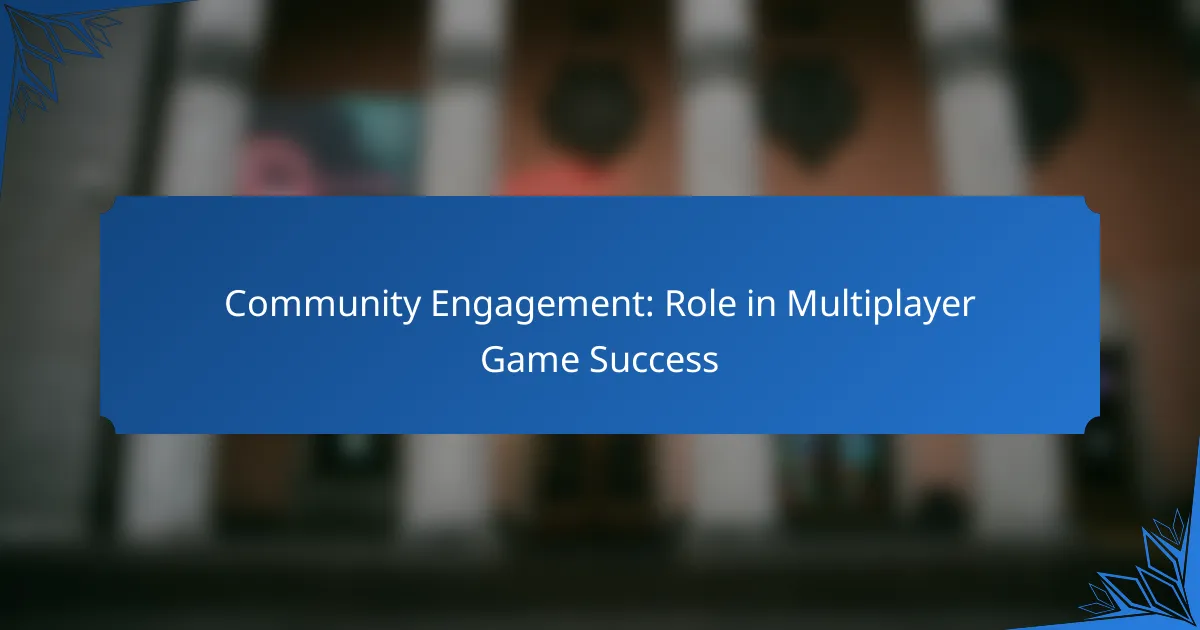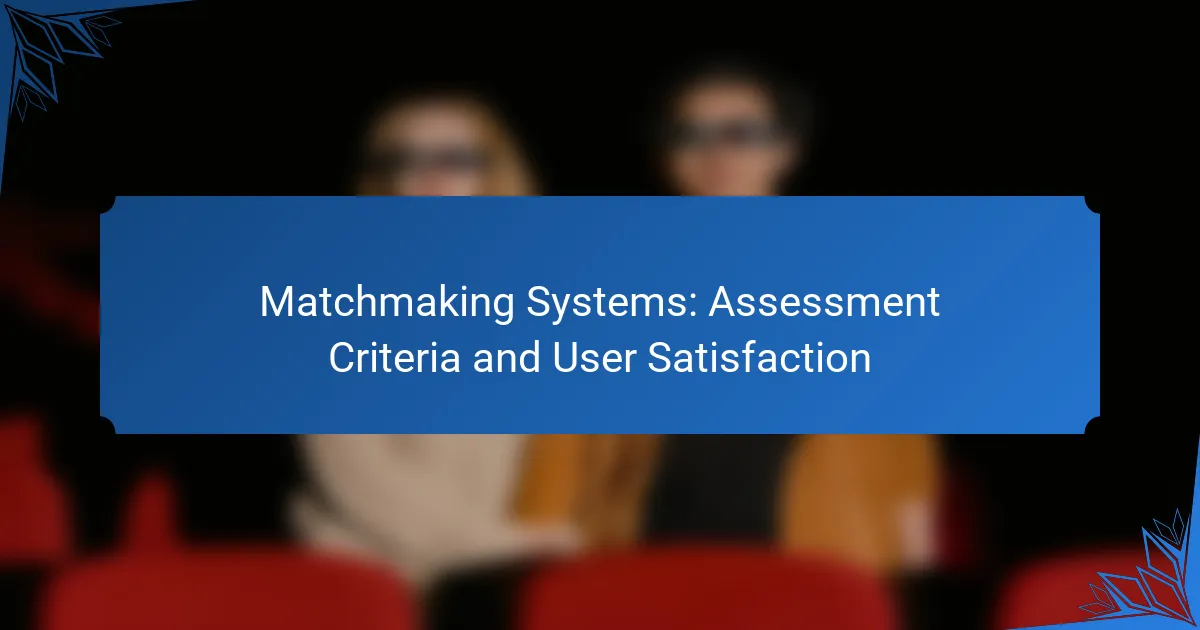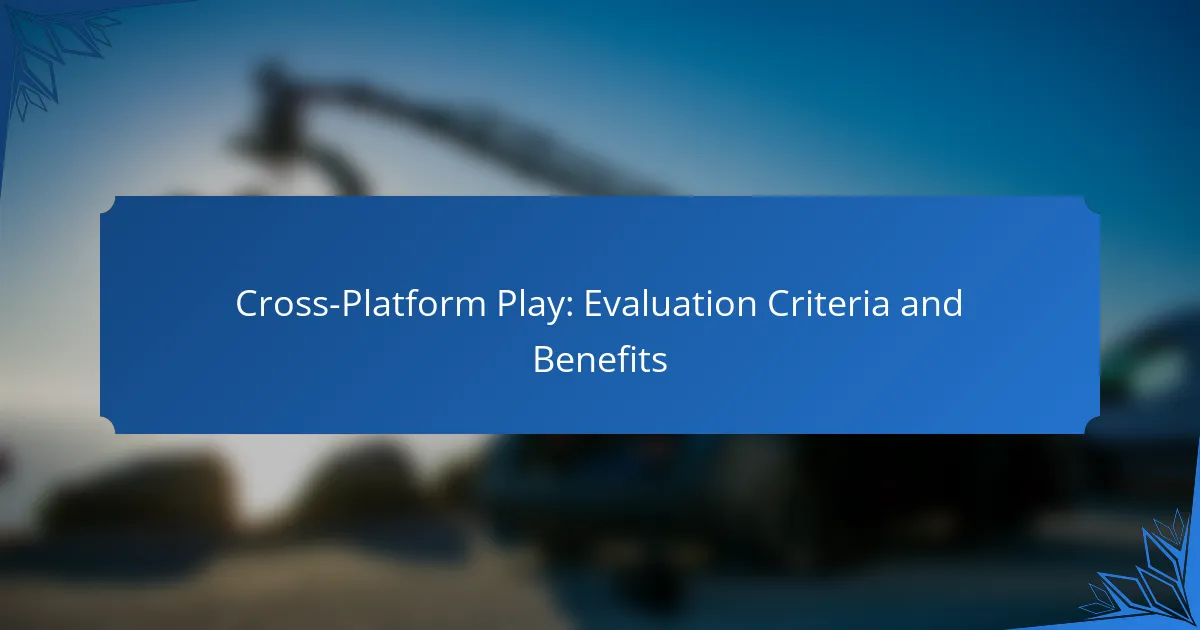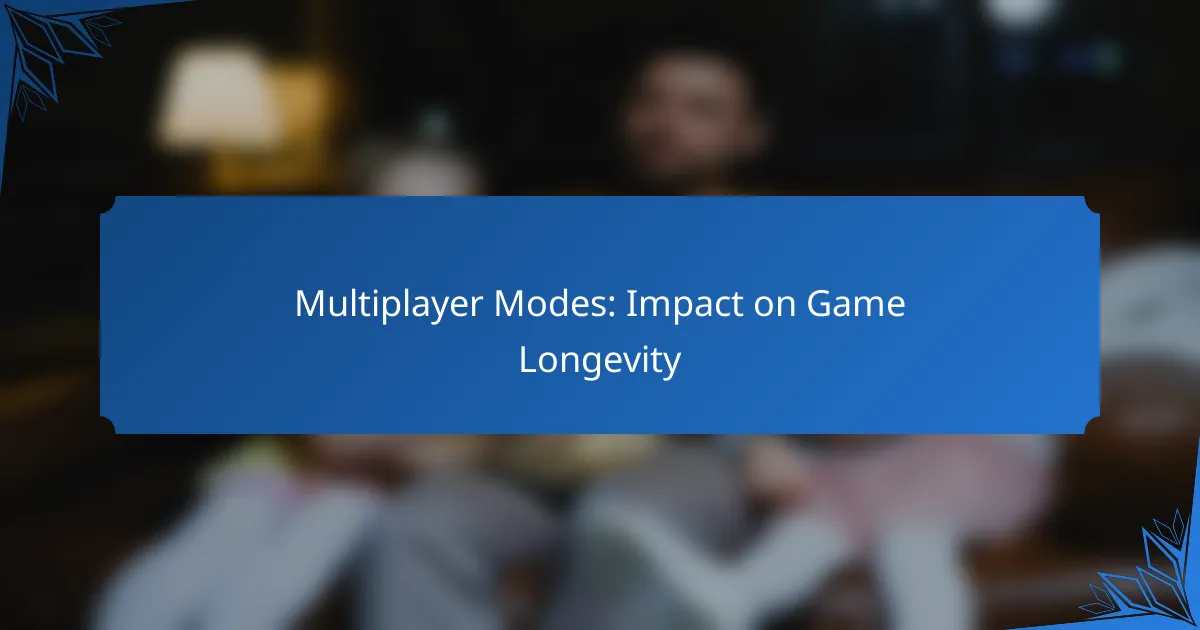Community engagement plays a crucial role in the success of multiplayer games by cultivating a dedicated player base and enhancing overall satisfaction. When players feel a sense of belonging within a community, they are more likely to remain engaged and invested in the game, leading to improved retention rates. Effective strategies, such as fostering an active online presence and incorporating player feedback, can significantly elevate the gaming experience.
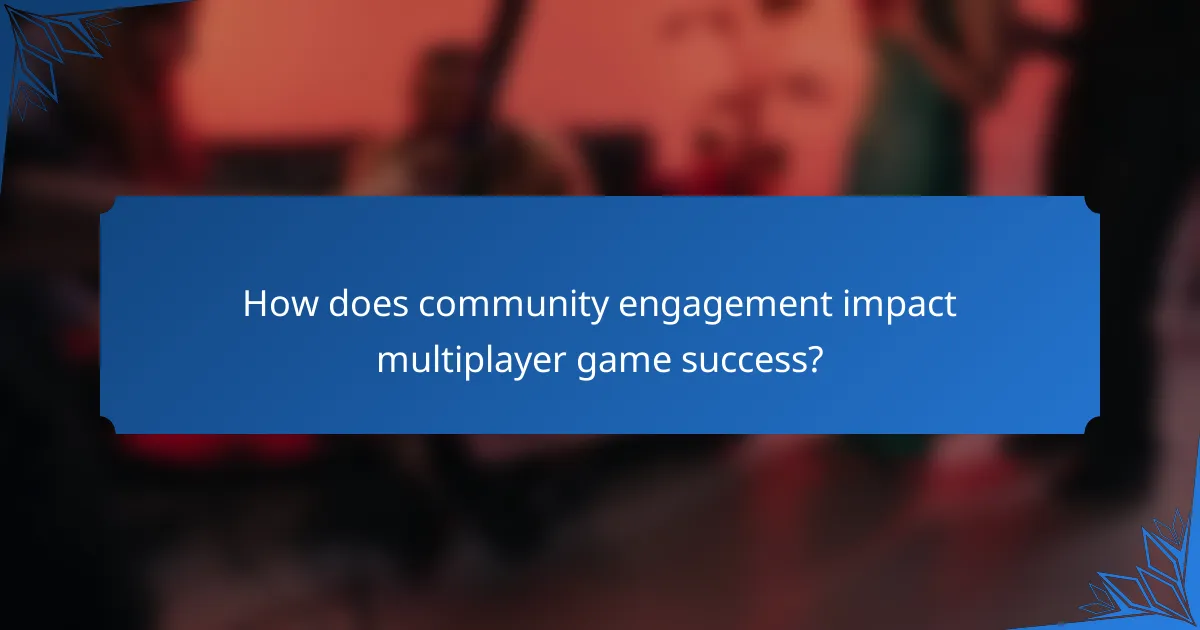
How does community engagement impact multiplayer game success?
Community engagement significantly enhances multiplayer game success by fostering a loyal player base, improving retention rates, and increasing overall satisfaction. When players feel connected to a community, they are more likely to stay engaged and invested in the game.
Increased player retention
High levels of community engagement lead to increased player retention, as players are more likely to return to a game where they feel a sense of belonging. Engaging players through forums, social media, and in-game events can create a vibrant community that keeps players coming back.
For example, games that host regular community events or tournaments often see a notable increase in player activity. This can be particularly effective if players are rewarded with in-game items or recognition for their participation.
Enhanced player satisfaction
Community engagement directly contributes to enhanced player satisfaction by providing a platform for feedback and interaction. When developers actively listen to player suggestions and concerns, it fosters a positive relationship that can lead to improvements in gameplay and features.
Games that incorporate player feedback into updates or expansions often experience higher satisfaction rates. Players appreciate when their voices are heard, which can lead to a more enjoyable gaming experience overall.
Stronger brand loyalty
Engaged communities often develop stronger brand loyalty, as players feel a deeper connection to the game and its developers. This loyalty can translate into long-term support, even in the face of challenges or competition from other games.
Building brand loyalty can be achieved through consistent communication, exclusive content for community members, and transparent development processes. Players who feel valued are more likely to recommend the game to others and remain committed over time.
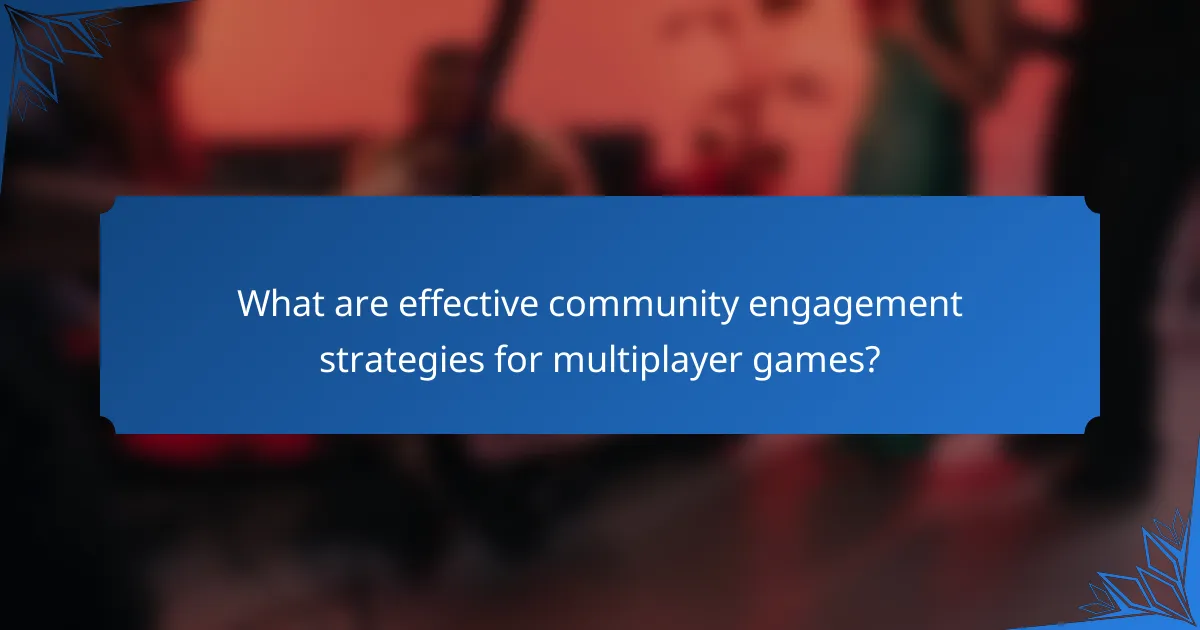
What are effective community engagement strategies for multiplayer games?
Effective community engagement strategies for multiplayer games include fostering a vibrant online presence, organizing interactive events, and actively incorporating player feedback. These approaches help build a loyal player base and enhance the overall gaming experience.
Active social media presence
Maintaining an active social media presence is crucial for engaging with the gaming community. Platforms like Twitter, Facebook, and Instagram allow developers to share updates, respond to player inquiries, and create a sense of community. Regular posts, live streams, and interactive content can significantly boost player engagement.
Consider using targeted hashtags and collaborating with influencers to reach a wider audience. Engaging with players through comments and direct messages fosters a personal connection, making them feel valued and heard.
In-game events and competitions
In-game events and competitions are effective ways to engage players and keep the community active. These events can range from seasonal celebrations to skill-based tournaments, offering players unique rewards and experiences. Regularly scheduled events encourage players to log in and participate, enhancing retention rates.
When planning events, ensure they are accessible to a broad audience. Consider time zones and offer various participation methods, such as solo and team competitions, to cater to different player preferences.
Player feedback integration
Integrating player feedback is essential for community engagement and game improvement. Actively soliciting feedback through surveys, forums, or social media helps developers understand player needs and preferences. Acknowledging and implementing suggestions can significantly enhance player satisfaction and loyalty.
Establish a transparent process for how feedback is used. Regularly update the community on changes made based on their input, which reinforces the idea that their opinions matter and fosters a collaborative environment.

Which multiplayer games excel in community engagement?
Games that excel in community engagement foster strong player interaction, collaboration, and feedback. Titles like Fortnite, World of Warcraft, and League of Legends have built vibrant communities through regular updates, events, and player-driven content.
Fortnite
Fortnite has revolutionized community engagement by integrating live events and seasonal updates that directly involve players. The game frequently hosts in-game concerts and collaborations with popular franchises, creating a shared experience that keeps players returning.
Additionally, Fortnite encourages user-generated content through its Creative mode, allowing players to design their own maps and game modes. This feature not only enhances player creativity but also strengthens community bonds as players share their creations.
World of Warcraft
World of Warcraft (WoW) has maintained a dedicated player base for years by prioritizing community interaction through guilds and in-game events. Players can join guilds to participate in cooperative gameplay, which fosters social connections and teamwork.
The game also hosts seasonal events and expansions that encourage player participation and feedback. Regular updates and community forums allow players to voice their opinions, influencing future content and ensuring that the game evolves with its audience.
League of Legends
League of Legends excels in community engagement through its competitive scene and player feedback mechanisms. The game hosts regular tournaments, allowing players to engage with the esports community and support their favorite teams.
Furthermore, Riot Games actively seeks player input through surveys and forums, ensuring that community concerns are addressed. This responsiveness helps maintain a loyal player base and encourages ongoing participation in the game’s development.
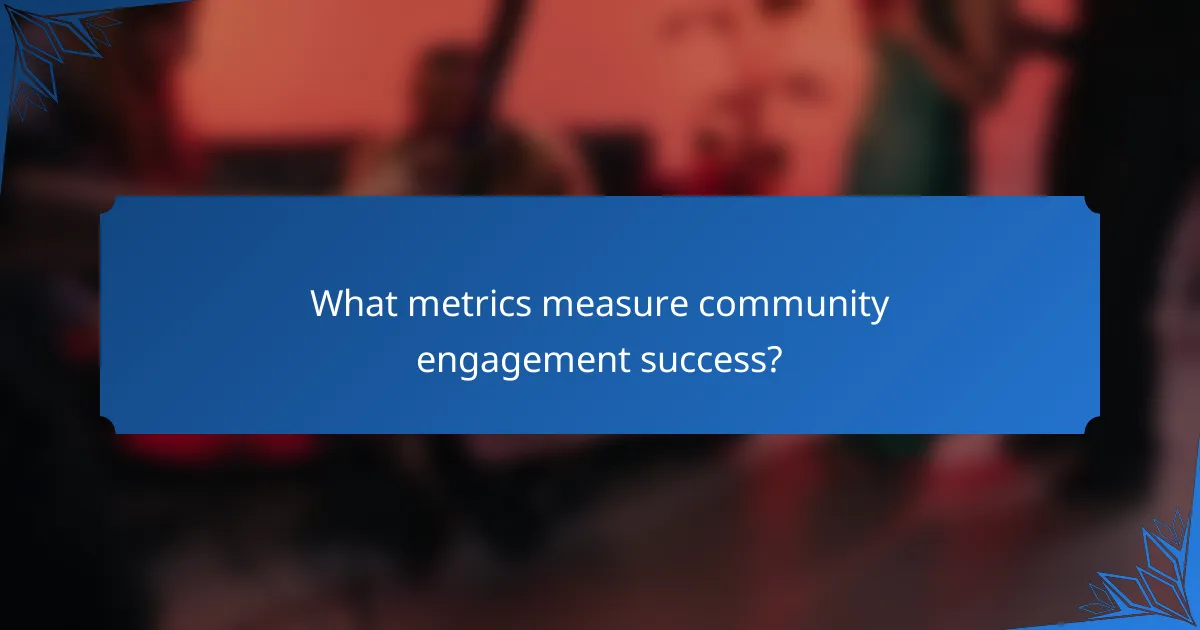
What metrics measure community engagement success?
Community engagement success in multiplayer games can be measured through various metrics that reflect player involvement and sentiment. Key metrics include active user participation rates, community sentiment analysis, and content creation by players.
Active user participation rates
Active user participation rates indicate how many players are regularly engaging with the game and its community. This can be measured through daily or monthly active users (DAU/MAU), which helps to assess retention and overall interest. A healthy community typically sees participation rates in the range of 20-30% of total players.
To improve participation, developers should focus on creating engaging content and events that encourage players to log in regularly. Monitoring peak activity times can also help in scheduling events that maximize player involvement.
Community sentiment analysis
Community sentiment analysis gauges the overall feelings and attitudes of players towards the game and its updates. This can be done through surveys, social media monitoring, and analyzing forum discussions. Positive sentiment often correlates with higher player retention and satisfaction.
Tools like sentiment analysis software can help quantify player feedback, allowing developers to identify trends and areas needing improvement. Regularly engaging with the community to solicit feedback can foster a positive atmosphere and enhance player loyalty.
Content creation by players
Content creation by players, such as fan art, mods, and gameplay videos, serves as a strong indicator of community engagement. When players actively create and share content, it reflects their investment in the game and can attract new players. Encouraging this creativity can lead to a vibrant community.
Developers can support player-generated content by hosting contests, providing tools for creation, and showcasing popular works on official channels. This not only boosts community morale but also enhances the game’s visibility and appeal.
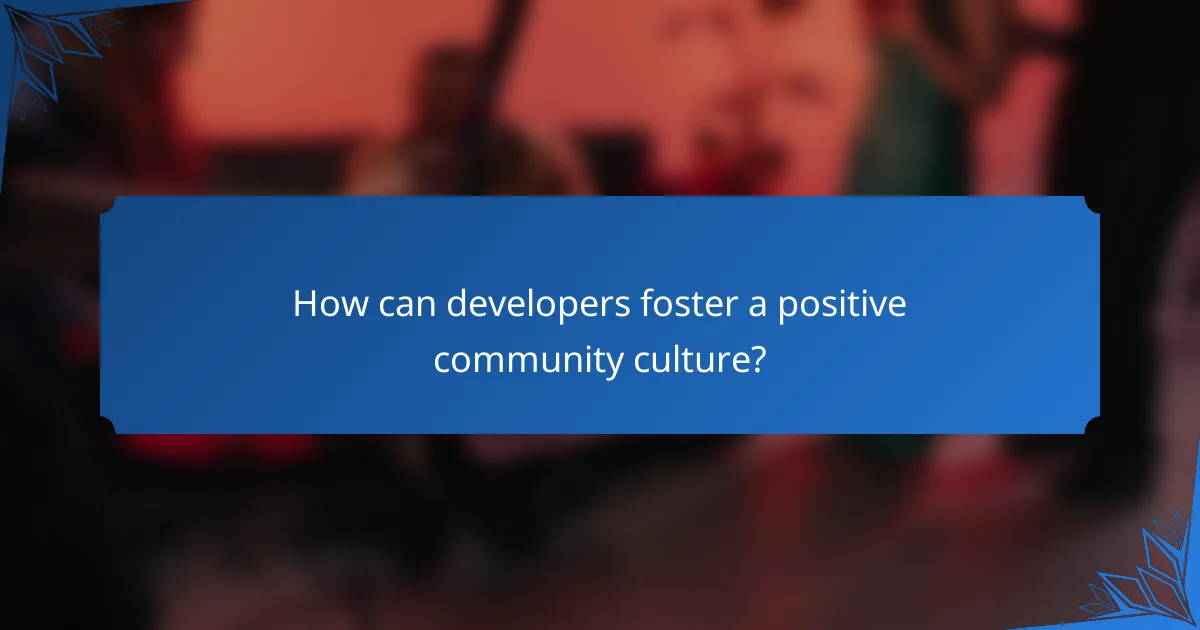
How can developers foster a positive community culture?
Developers can foster a positive community culture by establishing clear communication guidelines, moderating toxic behavior, and encouraging inclusivity. These strategies help create an environment where players feel valued and engaged, ultimately contributing to the success of multiplayer games.
Clear communication guidelines
Establishing clear communication guidelines is essential for fostering a positive community culture. These guidelines should outline acceptable behavior, language, and interaction styles within the game. Developers can provide examples of constructive communication and encourage players to follow these standards.
To implement this, consider creating a dedicated section in the game’s forums or help pages where players can easily access the guidelines. Regular reminders through in-game notifications can also reinforce these standards, ensuring that players remain aware of the expected behavior.
Moderation of toxic behavior
Effective moderation of toxic behavior is crucial for maintaining a healthy community. Developers should implement reporting systems that allow players to easily report inappropriate conduct. This can include harassment, hate speech, or cheating, which can detract from the gaming experience.
Utilizing a combination of automated tools and human moderators can help ensure swift action against violators. Developers should clearly communicate the consequences of toxic behavior, such as temporary bans or permanent account suspensions, to deter negative actions.
Encouragement of inclusivity
Encouraging inclusivity within the gaming community can significantly enhance player engagement and satisfaction. Developers should promote diverse representation in character design, storylines, and community events, making all players feel welcome and appreciated.
Additionally, hosting events that celebrate diversity, such as themed game nights or contests, can foster a sense of belonging. Providing resources and support for underrepresented groups can further strengthen community ties and encourage positive interactions among players.
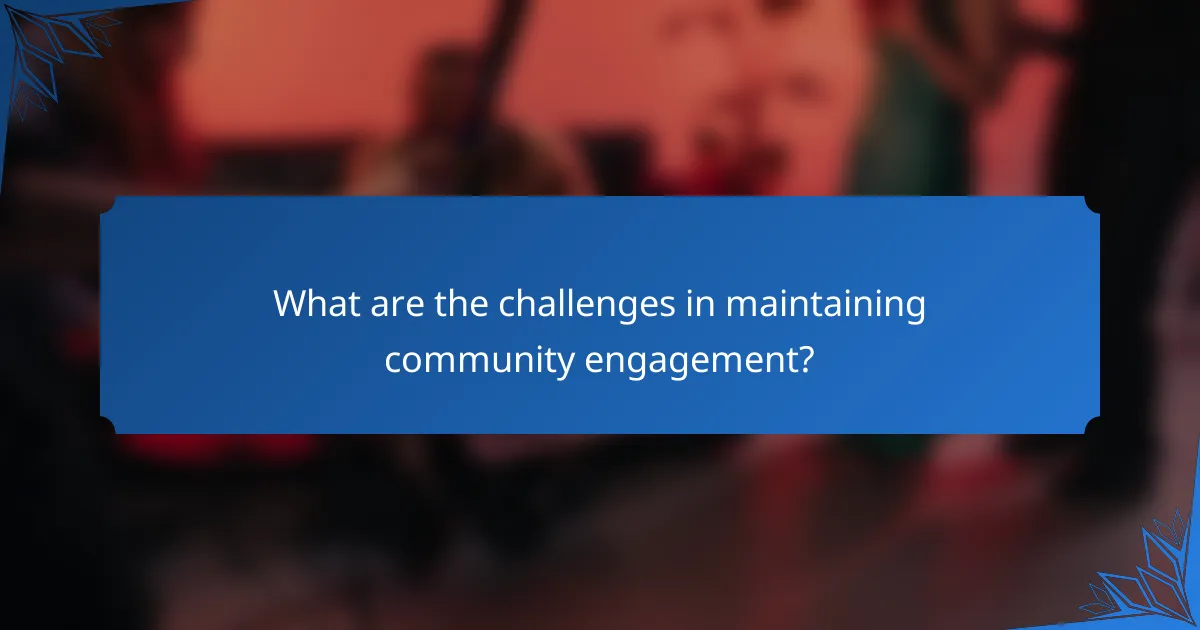
What are the challenges in maintaining community engagement?
Maintaining community engagement in multiplayer games involves several challenges, including player retention, communication, and fostering a positive environment. Developers must actively address these issues to keep players invested and involved.
Player Retention
Player retention is crucial for the longevity of multiplayer games. Developers need to create compelling content and regular updates to keep players returning. This can include new game modes, seasonal events, or exclusive rewards that incentivize ongoing participation.
To effectively enhance retention, developers should analyze player behavior and feedback. Understanding what keeps players engaged can help tailor updates and features that resonate with the community, ultimately reducing churn rates.
Effective Communication
Clear and consistent communication is vital for maintaining community engagement. Developers should utilize multiple channels, such as forums, social media, and in-game announcements, to keep players informed about updates, events, and changes. This transparency builds trust and encourages player involvement.
Additionally, engaging directly with the community through Q&A sessions or feedback surveys can foster a sense of belonging. When players feel heard, they are more likely to remain active participants in the community.
Fostering a Positive Environment
Creating a positive gaming environment is essential for community engagement. Developers must implement effective moderation tools to manage toxic behavior and promote inclusivity. This can include reporting systems, community guidelines, and active moderation teams.
Encouraging positive interactions among players can also enhance the overall experience. Developers might consider hosting community events or competitions that reward teamwork and collaboration, which can strengthen bonds within the player base.
